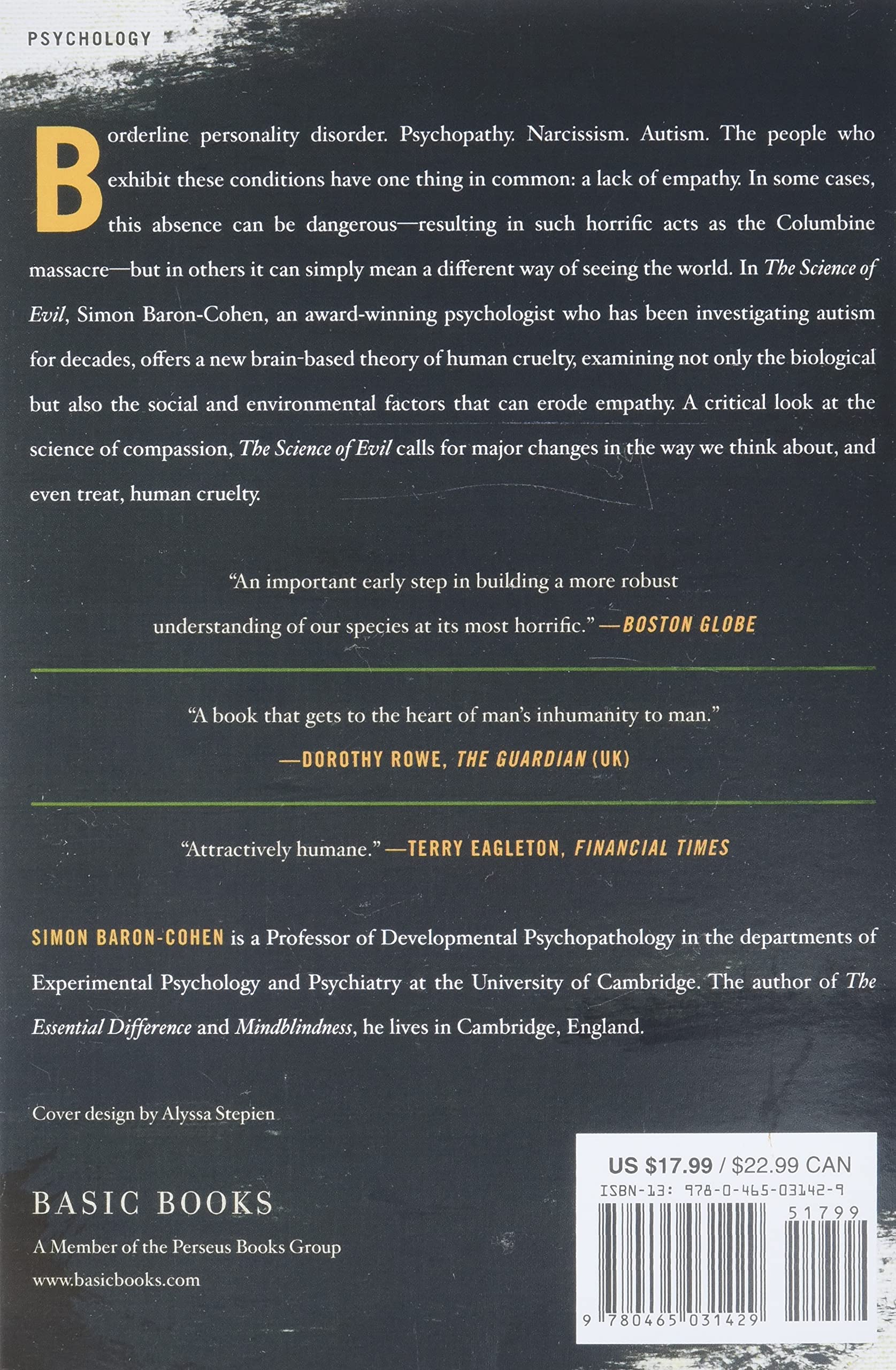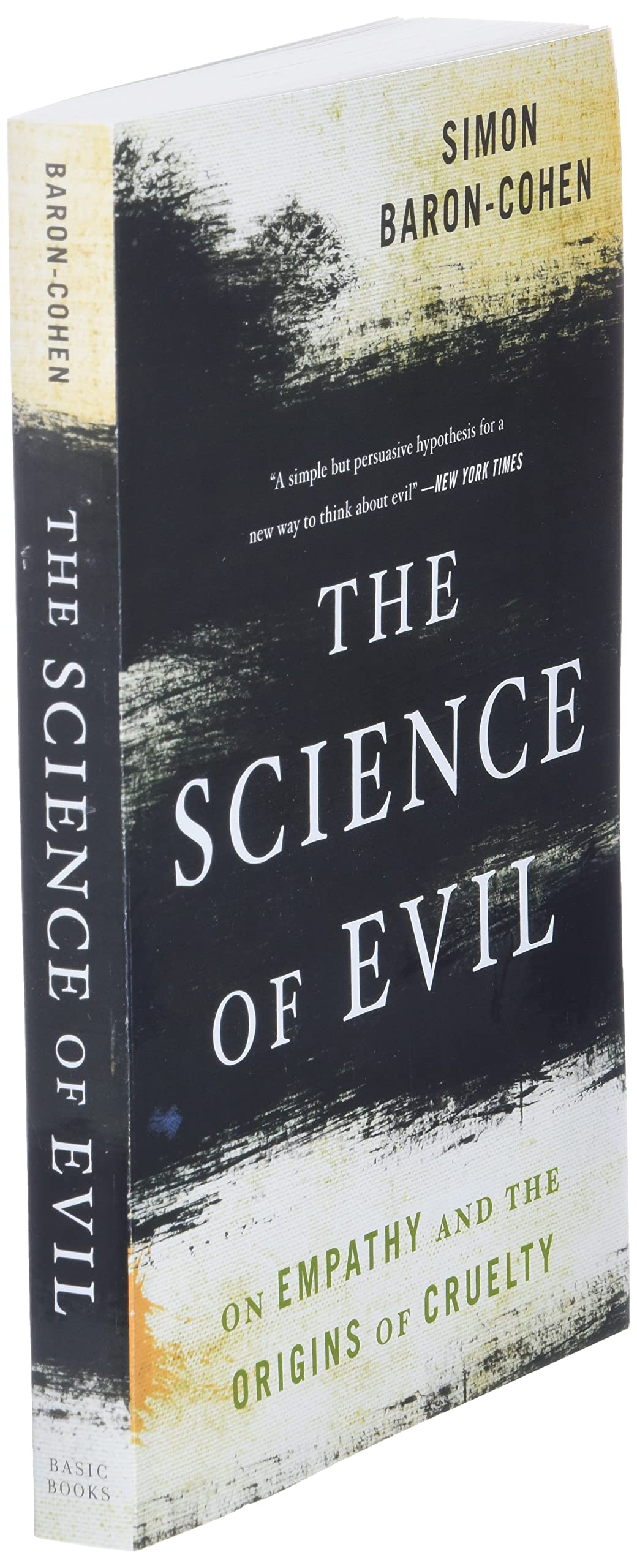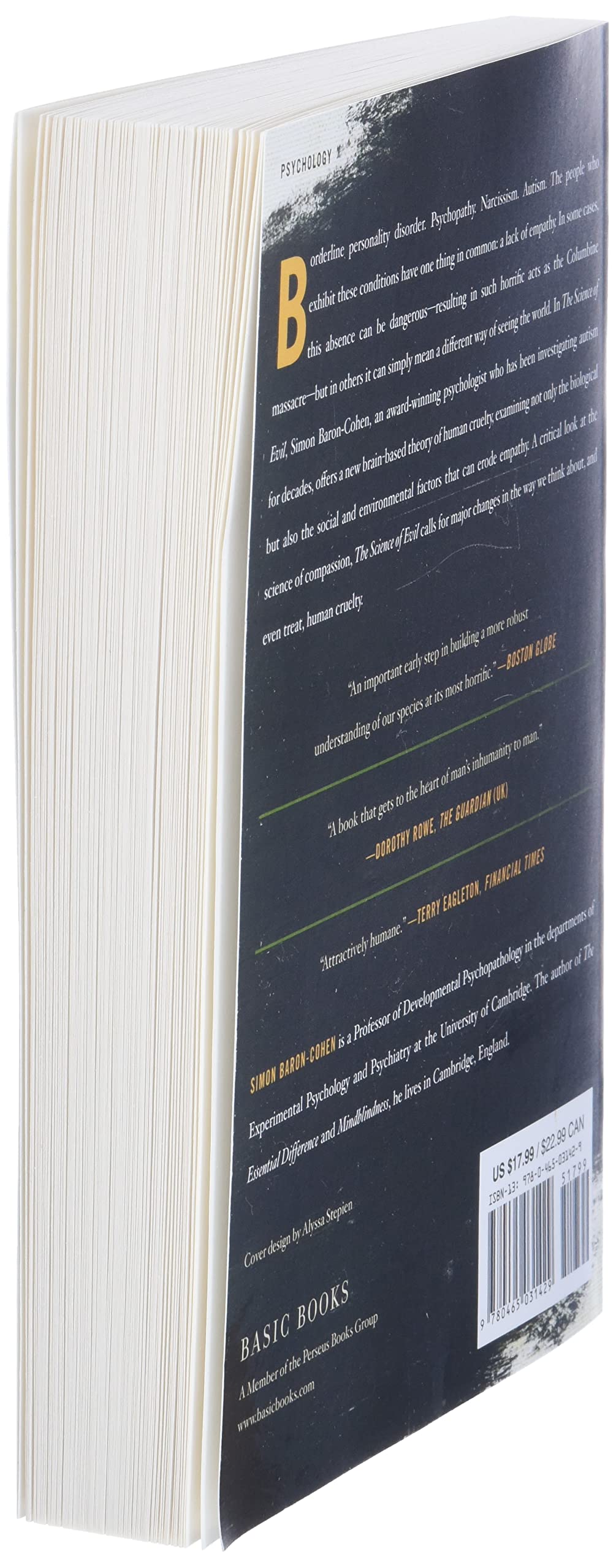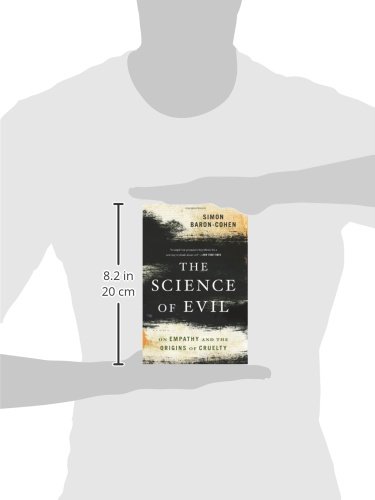Customer Services
Copyright © 2025 Desertcart Holdings Limited
Desert Online General Trading LLC
Warehouse # 7, 4th Street, Umm Ramool, Dubai, 30183, Dubai






Full description not available
E**N
Excellent contribution to our understanding of human behavior
If you have any interest in why people can be rude or cruel to others, this is a must-read. I should say, up front, in the interest of full disclosure, that I've written a book myself that stresses how important empathy is, so I was predisposed to like this book.There are parts of the book that get into technical details, especially about brain structures, but overall this is a good layman-oriented read, requiring no pre-requisite knowledge -- though the more you know about the subject, the more you'll get out of the book. It's the kind of book that makes you go "Aha!" and leaves you wanting to know more.Prof Baron-Cohen begins this work by noting that traditional discussions of evil aren't terribly useful, not if you want a secular and scientific explanation. Calling something evil doesn't really explain anything. But by relating evil to a lack of empathy, things start falling into place. We have a set of structures in our brain that participate in an "empathy circuit". This is what allows us to relate to what other people are feeling, what makes us the social animals we are.Empathy can be divided into cognitive empathy -- the brain function that lets us read others' emotions -- and affective empathy -- the brain function that produces an emotional response in us that simulates what another person is feeling. With both active, we feel sad when others are sad, laugh when they laugh, etc. Where evil comes in is at the low end of the bell curve: those with "zero" empathy. Zero empathy can be either negative or positive. Examples of zero-negative types would be those with borderline personality disorder, psychopaths, and narcissists. Psychopaths may actually have cognitive empathy -- the ability to read others -- but no affective empathy, which allows them to use their knowledge of others' emotions as a tool, without feeling any remorse or guilt about it.You may recognize some people you know, or know about, from the author's descriptions. E.g., the person who is always rude, because he does not understand or feel the effect of his comments on other people. If we say something hurtful, we'll often feel bad about it later, but the zero-negative won't -- he doesn't get it. (The author briefly discusses a transient loss of empathy.)An example of a zero-positive personality type would be someone with Asperger's Syndrome, where the lack of emotional understanding does not turn negative and is also accompanied by an ability to systematize -- see patterns in -- things that those with more typical brains would miss. (The author is Director of the Autism Research Center at Cambridge Univ.)That people differ in the amount of empathy is a product of both genetics and environment, acting together. It's impossible to split them. For instance, a tendency to violence may require a genetic predisposition to violence, but it won't show up in a person's behavior unless the environment enables it.There's a section in the book called "Reflections on Cruelty" which is interesting. I won't go into that here, but it includes a rejection of Hannah Arendt's "banality of evil" , which had been based on the early proceedings of Adolf Eichmann's trial -- before it became clear that he had done far more than just follow orders.Also worth noting: there are two Empathy Quotient tests in the book, one for adults, and one for parents to fill out for their children. You may not be as empathetic as you think -- or maybe more so.I'm looking forward to the author's next book.
S**S
This is a great book with a misleading title
This is a great book with a misleading title. If you're looking for a textbook, this is not it. If you're looking for an in-depth discussion of evil and free will, this is not it. What the book is, is highly readable, almost a page-turner, reviewing the science of empathy. This is highly relevant for psychotherapists of many types who are trying to understand who among their patients with poor moral development is likely to be a good candidate for therapy. The book is also useful to parents of persons on the autism spectrum who are struggling to understand their child's now-you-see-it-now-you-don't style of morality. The author describes, very briefly, the neuroscience of empathy as derived from brain imaging and genetic studies. (If you can't handle all the brain anatomy, skip that chapter and keep reading.) He then reviews the Empathy Quotient Scale (helpfully included in the book!) and the results obtained in persons with different types of psychopathology. He explains how low empathy accounts for some of the behaviors observed in persons with borderline, narcissistic, and psychopathic (or antisocial) personality disorders; and then compares and contrasts with persons on the autism spectrum.As a child psychiatrist, I found only a couple of trivial points to dispute. (For example, the reason that many kids with conduct disorder don't grow up to have antisocial personality disorder has more to do with how conduct disorder is diagnosed than that they suddenly develop empathy. Baron-Cohen also doesn't note that there are kids diagnosed with conduct disorder who are not callous and unemotional.) Having finished the book yesterday, I recommended it to a patient today and brought it up in discussion with a colleague. Not definitive, but worth the time to read.
J**F
A great book but too short
I read Science of Evil: On Empathy and the origins of Cruelty by Simon Baron-Cohen at one sitting. That's rare for me. I usually like to dip in a little and then think it over for a day or so but the material was so gripping that I was on the edge of my seat. I waited quite a few days before writing this review to process what I read. Here is what I've concluded: if you want to truly understand evil, its source and a possible direction for a solution to evil this book is for you. It gave me valuable new insights into evil as well as providing a solid, scientific basis for conclusions I've reached through study and experience. And it lead me to pursue deeper research on the study of evil and empathy. What made this book so gripping was its relevancy. Like all of us, I have had way too many exposures to evil in my life. I submit that on a bell curve evaluating those who have personal knowledge of evil I would be on the downward slope toward the extreme range. Without going into the grim details, I've seen, heard, and experienced evil from the inside out. I live it as a victim of sexual abuse. I studied it as a historian. And I observed it working in a maximum security prison for two years. I am a counselor on the GI Rights Hotline and have been trained in suicide intervention. Today I take calls and work on cases of men and women who in many cases have experienced evil first hand. I hear their stories as well of the stories of vets suffering from PTSD trying to get help for their suffering. While working in the prison system, 1978 - 1980, and more recently in my career as a public school teacher I worked with the emotionally challenged. Public school teachers, particularly if you taught in inner city schools, work daily with some children who are severely emotionally and sometimes physically damaged. And finally, my wife and I spent years living and working unsuccessfully with a family member who is emotionally disturbed. We know only too well how lonely, difficult, and relatively unsupported such work is. Reading Science of Evil, I realized the sad soul why were trying to help was suffering from undiagnosed Asperger's. That discovery was a huge relief. We finally understand why he was so unempathetic and, yet, thankfully did not seriously harm others. So I have more than a passing interest in the subject of evil and empathy, the two subjects of Baron-Cohen's important book. Most of the books I've read about evil have been from the perspective of depth psychology. Since 1980, I've read and reread pretty much everything Erich Fromm has written on human destructiveness and aggression. These books delve deeply into evil and its causes. Fromm has written fascinating case studies of Martin Luther, Hitler and Himmler. But these studies, while based on impeccable logic and the best available science of the time, are subjective. Baron-Cohen's book is based on sound objective science. Both men were serious men of science. Fromm (1900- 1980), founder of Scientist Against Nuclear Energy (SANE) was a psychoanalyst and sociologist who had advanced degrees in both. Simon Baron-Cohen is Professor of Developmental Psychopathology at the University of Cambridge in the United Kingdom. Both share the perspective of a Jew, in the case of Fromm a German Jew, who knows evil all too intimately. This gave both a unique ethnic/racial perspective unavailable to most gentiles. Both Fromm and Baron-Cohen also write that evil is closely related to the objectification of the other. Viewing people as non-human or deeply "other" is necessary for a human to rape, beat, mutilate, enslave or murder. Fromm explains the process of evil from a sociological/psychological perspective that while profound is not fully objective. He, like Baron-Cohen, concludes that close to zero empathy occurs with those who commit evil actions. Baron-Cohen, however, provides a modern, scientific basis for similar conclusions reached by Fromm working before modern neuroscience. The book Science of Evil is not all science. Baron-Cohen shares his horrors reading as a child about Nazi's who ran concentration camps by day and went home at night to read nursery stories to their children from a light with a shade made of human skin. Such stories jolted me out of my white- male privileged comfort zone but imagine how much more affecting if I had had relatives who were murdered in a such camps. Baron-Cohen also shares lessons learned from years of cutting edge research with the autistic. Serial rapists, murders and the autistic and those suffering from Asperger's Syndrome share being at or near zero on the empathy scale Baron-Cohen and his colleagues developed. However, people with autistic and Asperger's seldom if ever hurt others. The difference is they have developed a moral code that keeps them from harming others. In Baron-Cohen's analysis it's the difference from zero-positive from the zero-negative of the narcissist, Machievellian, and psychopaths. This is a powerful insight with enormous implications. Even people with zero empathy - with autism and Asberger's can be trained or train themselves not to harm others which they see as essentially objects. But what about psychopaths? Are they even capable of empathy? I've known a few psychopaths in my day and the question haunted me but the answer was not available in Baron-Cohen's Science of Evil. I looked online for answers to this question. In the Netherlands brain imaging research of psychopaths in prison for violent crimes revealed that "charming" (Machievellian?) psychopaths can turn on and off empathy. See - Coldhearted Psychopaths Feel Empathy Too by Tanya Lewis, July 24, 2013 07:19pm ET posted in livescience.com Researchers had psychopaths while being imaged see a film which consistently evoked empathetic brain response in "normal" humans. There was no empathetic brain response in the psychopathic subjects. Asked to watch the film again while "trying to be empathetic" their brains lit up like normals. This is proof that zero-negatives could potentially become zero-positives. However, as my own experience with criminals suggest caution is needed. When I worked at Narconon at the maximum security prison in Minnesota (SRM) my partner and I concluded that what we were producing in our program were "happy criminals." Leopards don't easily change their spots. Most prisons are universities of lower learning where criminals become better, more successful criminals. Not that they can't change nor that we shouldn't keep trying but it's a long hard slog with many setbacks and few successes. In the title to this review I suggested the book was too short. Like any good read, Baron-Cohen left me wanting more. But could more be less? Not in this case. Obviously, Baron-Cohen couldn't include research that happened after publication. However, I think the author might have shared some of the research of neuroscientist Dr. Richard J. Davidson, who leads the Center for Investigating Healthy Minds at the Waisman Center, University Wisconsin-Madison. Davidson and his colleagues conduct rigorous scientific research on healthy qualities of mind such as kindness, compassion, altruism, forgiveness, mindfulness and well-being. Their findings support Baron-Cohen's thesis. For further theory read A General Theory of Love by Thomas Lewis, Fari Amini and Richard Lannon, three San Francisco Bay psychiatrists, who popularized limbic resonance which arise as we experience empathy and intuition. For ways to deepen your own empathy I recommend A Path With Heart and A Wise Heart by Jack Kornfield a clinical psychologist, meditation teacher and former Buddhist Monk in the Theravadin tradition. Length aside, this is a wonderful, important book that deserves five stars, with a little more stuff.
A**R
Great product
Very interesting book.
C**.
Para reflexionar
Un libro excelente, con muy buenos ejemplos, con gran explicación. Toca temas controversiales sobre lo que hacemos hoy en día con la maldad en base a su teoría sobre la falta de empatía.Deberíamos todos leerlo para poder aprender a juzgar realmente bien las decisiones en tema de leyes de hoy en día, para entender a la gente alrededor y lo que hace.
W**R
Entender melhor o mundo no qual vivemos e agimos
É uma história que deveria ser conhecida pela atuais gerações, pois contribuiria com a melhoria das ações, geradas pelo desconhecimento da nossa história humana.
V**A
Boring
Tedious with stereotypical examples of non-empathic types.
R**R
excellent read and based on science
very good book . explains the personality types and reasoning why . eye opener
Trustpilot
2 months ago
2 weeks ago